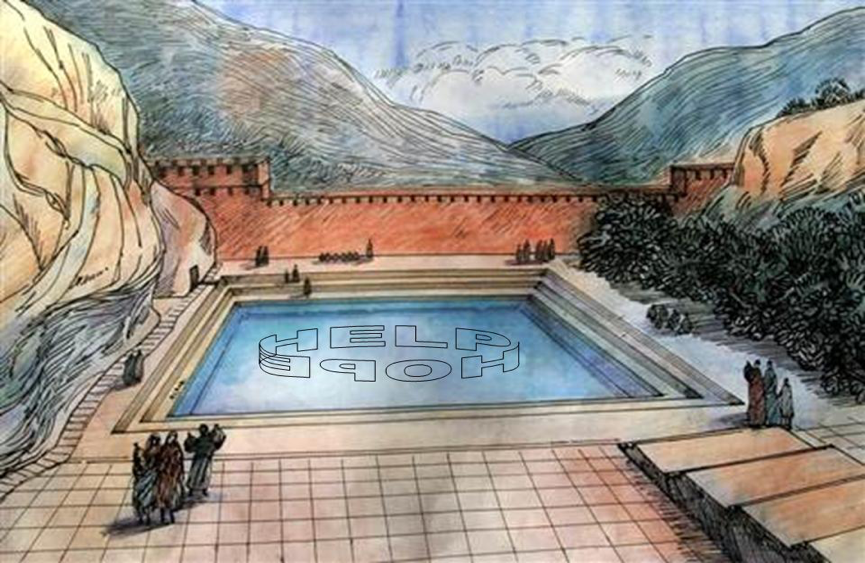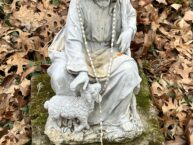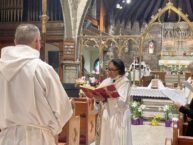 May 1, 2016: May God’s words alone be spoken, may God’s words alone be heard. Amen.
May 1, 2016: May God’s words alone be spoken, may God’s words alone be heard. Amen.
What a great Sunday we had last week – having the joy of being host to our bishop. And I think his visit was perfectly timed, because we are in Eastertide, and he talked a lot about all of the new life he sees here at Christ Church. I think many of the adults wanted a “flat Jesus” like he handed out to all the children too. He also brought the vestry, our lay leaders, out for a walk around our neighborhood before the worship service, to really see what we so often walk past as we go from our cars into these church doors. I thought a lot about that when reading the texts for this Sunday.
Now, what I love about the scripture stories the most are the richness of the characters, people whose words and actions (or inactions) weave a narrative that can touch our hearts and move us in our faith. And we have some great ones today in our Gospel reading from John. Let’s take a look at these folks.
Up first, we have a man who has been laying by a pool – a pool that is said to have healing properties when the water is stirred up – and he has been there, lame, for 38 years.
Then there are the people who are getting to the pool ahead of the lame man, not seeing him, or perhaps pushing past him in their effort to get to the waters.
There is Jesus who sees him, and heals him.
And there are the Jewish authorities, while not mentioned in the verses we heard today, are very much present in the verses that immediately follow.
It’s a great story, and one of the things that really stands out is that when Jesus encounters the man, the one who has been lame all his life, hoping to be healed, he says to him, “Do you want to be made well?” Now, it seems to me that is sort of like when your mother-in-law says, “Do you want some advice?” – I mean – what kind of question is that? And the man explains to Jesus that he keeps trying to get into the pool every day – has been for 38 years – but never makes it.
Now, Albert Einstein once defined insanity as, “doing the same thing over and over again and expecting different results.” Maybe Jesus’ question isn’t all that silly in light of that, but I am guessing that the lame man has over time become lame in more than just his legs. He is paralyzed – not only physically, but spiritually too. And this spiritual paralysis has come from those who do not see him, push past him, have no compassion for him.
As a result, his entire life has boiled down to a single minded focus on the pool as the source of salvation. He has blocked out all other ways of living, of being. His mat, the pool, it all becomes something he is so used to that when Jesus asks him if he wants to be made well, he doesn’t respond with “Yes!” but with an explanation of how he can’t seem to get into the pool ahead of anyone else. He is in a rut – physically, emotionally, and spiritually. I am sure some many of us can relate, or know people who would understand this man far more than they would like.
When I think of this man on the mat for 38 years, trying to get to the same pool day after day after day, it reminds me of a great little poem “Autobiography in Five Chapters” written by Portia Nelson. It goes like this:
Chapter One
I walk down the street.
There is a deep hole in the sidewalk.
I fall in.
I am lost …. I am helpless.
It isn’t my fault.
It takes forever to find a way out.
Chapter Two
I walk down the street.
There is a deep hole in the sidewalk.
I pretend that I don’t see it.
I fall in again.
I can’t believe I am in this same place.
But, it isn’t my fault.
It still takes a long time to get out.
Chapter Three
I walk down the same street.
There is a deep hole in the sidewalk.
I see it is there.
I still fall in … it’s a habit … but, my eyes are open.
I know where I am.
It is my fault.
I get out immediately.
Chapter Four
I walk down the same street.
There is a deep hole in the sidewalk.
I walk around it.
Chapter Five
I walk down another street.
“I walk down another street.”
“Do you want to be made well?”
It’s not a bad question when you think about it, because in some ways, this man has been traveling down the street with the same deep hole in the sidewalk and expecting different results. It is about the entirety of the journey, not just the deep dark hole in which we find ourselves. When Jesus asks that question, the man is being asked to consider his life, not just his infirmity. He was asking him to choose another street – to look, not at the pool, but at Jesus, and the healing Jesus offers to him was that he get up, take his mat, and walk.
Now here’s where it gets even more interesting, because ultimately that simple command, and the action that followed – the action that liberated this man from the chains of his illness – really, really annoyed some folks. And you know why? It is in the last line of the Gospel reading for today… “Now that day was a Sabbath.” When the Jewish authorities discover that it was Jesus who healed this man, and that it was done on the Sabbath, they are angered to a point of wanting to plot his death.
All because Jesus had the audacity to heal on the Sabbath, and tell the man to pick up his mat and walk (having him break the Sabbath too). Jesus dared to go against religious teaching and scripture! Now that’s something to really think about – our savior – the good and observant Jew who went to the festival – Jesus… he shook up the religious establishment – he didn’t do things the way they have always been done!
You gotta love Jesus, right?
But the truth is, that it really isn’t so much about any particular law or tradition that is getting under the skin of these temple elite. There is fear that this will bring change to structures that have been at the core of the faith for years – and undergirded the power of those in authority. And, it is fear of the unknown, of walking rather than being tied securely to the ground, that grips them. Rejection of Jesus is a rejection of the possibility of new and unprecedented ways of knowing God – a new way of living a life of faith – a way of life that scares those for whom scripture and tradition has become a mat to cling to.
Erupting all around Jesus and also his followers, as we heard last week in the scripture reading from Acts, were conflicts about adhering to Jewish law, including circumcision and dietary restrictions. But, Jesus was always trying to get his disciples to understand that the kingdom of God is about far more than that.
But before we go and judge these contemporaries of Jesus, we should look at those “temple authorities” at work in our own church today. I recently read the book “Priest Forever” by the Rev. Carter Heyward. It is the story of the days leading up to her becoming one of what is now known as the Philadelphia “11” – the group of brave women who were ordained to the priesthood in 1974, by a few courageous bishops in defiance of the church – a church who for General Convention after General Convention left women who were trying to answer the call of the Holy Spirit to ordination laying beside the pools – unable, for the trampling feet of those for whom doctrine and dogma had become blinders encasing their eyes, unable to live fully into who they were called to be as beloved children of God.
Thankfully, the body of Christ alive could not be contained – and commanded these women and those who ordained them to get up and walk! And walk they did. And with their actions, they changed the church – changed us – turning us to follow the Holy Spirit where she was leading us.
As Dr. Martin Luther King, Jr. once said ““The arc of the moral universe is long, but it bends towards justice.” We began to bend.
And should you think that the church has moved past that, we need only look at the troubles in our own Anglican communion now over the ordination of gays and women, the consecration of a female Presiding Bishop, and marriage equality for LGBT people.
We live in world filled with the paradox of brokenness and wholeness, of hurt and healing, of love and fear. And so many of us wait beside pools, hoping that something will happen – something or someone will make things different for us – for the world. We begin to cling to our mats – to doing things the way they have always been done – tied to the same actions with the same results. In some ways, we begin to find comfort being tied in that way – it is familiar – and, while that can feel safe, being tied like that can also be dangerous for ourselves and others.
I am reminded of the story of the two guys who were out hunting and come upon what appeared at first as an abandoned farm. The barn was sagging, the house was in disrepair, and there were junk cars and car parts lying around. The only thing that made it a working farm were a few chickens pecking away and a goat wandering around.
As they entered the yard they came across an old well.
One guy asked the other “Wonder how deep it is.”
His buddy replied, “Let’s drop something down and listen for the splash.” They looked around for something to drop down the well, but the only thing close by was an old transmission. They both hauled it over to the well and dropped it in (I never said they were smart these two guys). They counted and waited a long time for the splash. It was deep, deep well all right. They turned to leave and saw the goat was charging at them, head down, horns headed straight for them. At the last moment they jumped aside, and the goat went right past them and straight over the side and down the well. They looked at each other in amazement.
Now, a few minutes later, the owner of the farm came up. They chatted for a moment and as they started to go, the farmer asked, “You didn’t happen to see my goat, did you.? He’s not in the field where he usually is.” They said, “Your goat almost killed us charging at us. You should have had that goat tied up.” The farmer said, “I thought I had him tied up to an old transmission.”
(no actual goats were harmed in the telling of this story)
I suppose sometimes what seems safe can be what brings our downfall. We can sometimes get ourselves tied up to things, comfortable on our mats, safe in the comfort of familiarity. But Jesus calls us to let go and get up.
“Do you want to be made well?”
In the final analysis, it’s a question we each must answer on our own. We can start by asking ourselves, what do we need to be healed of? What’s our impediment? Is it self-imposed? What are we waiting for, or beside? What pain are we experiencing, what devotion are we tied to, and is it misplaced? What expectations do we have about what lies ahead? We can begin to consider the mats on which we live – anger, fear, grief, brokenness, greed – and who or what stands in our way, and are we a part of that for others – refusing to see the people on the margins? What streets do we walk every day expecting a different result?
It is also a question for the church – do we want to be made well?
For too many centuries, and still today, the church has been the ones blinded to those who gather by the pool, and to our own responsibility in pushing them there. We have been blinded by ignorance, blinded by indifference, and even blinded by bigotry. Jesus was doing a lot more than healing this man on that day, he was trying to heal his faith community – trying to restore it in the fullness of relationship with God, through the honoring of our relationships with one another. He was not only there to heal the lame man, but all of the others who for years pushed past him to get in the pool, or who valued tradition and scripture over compassion and love.
I’ve said it before and I’ll say it again… God did not walk among us to teach us to be a denomination or a religion. God came to us to teach us how to love one another. If you believe that God wants you to marginalize another part of God’s creation – you are flat out wrong! God loves everyone – all people – gay, straight, Muslim, Jew, male, female, conservative, liberal, all races, all people, all animals and creatures, all of life. Period. No exceptions.
As a people of faith, it is beyond imaginable that we too often have walked past people like the man in this gospel – these unseen people in pain – as we chant our mantra – this is the way it has always been done. We have become chained to our own mats of doctrine, dogma, and yes – even scripture when we try to read it literally. Those holiness codes and commandments that Jesus broke are still a part of our bible to this day. A bible that for far too long has been used as a weapon of hate – justifying slavery, oppression of women and of gay people. We have used this beautiful collection of sacred texts, this bible which is filled with love and truth, to marginalize and exclude, just as his earliest disciples tried to do, just as these Jewish authorities tried to do, valuing text and law over love.
Essentially, we have continued to walk down the same street near the same dark hole expecting different results, and wondering why the largest growing denomination today are the “Nones” – the ones who answer None to the question of “What religion are you?”
But there is hope. There is always hope.
We have baptized so many people in the past year, and another baptism is coming up on Pentecost. And during a baptism, just as we did last week with our bishop, we renew our baptismal vows, which remind us that in our baptism, we are brought into death and into new life in Christ, dying to all that holds us from the fullness of relationship with God. As Carter Heyward wrote, “At the center of Christian faith is a curious paradox: if we are to save our lives, we must lose them. If we are to live as whole people, we must be broken…Like bread, each of us is a sacrament, an outward and visible sign of an inward and spiritual grace.”
This is a world filled with those who wait by pools – people broken by fear, homelessness, poverty, bigotry, and violence. In our baptism, we are made a part of the body of Christ alive in the world today – healed, restored, and renewed at this table to live as he lived in the world.
So let’s take up our mats and walk – and by our lives proclaim loudly as Jesus did that we will always be on the side of justice over doctrine, compassion over dogma, love over tradition. Because there is a whole lot of folks in dark holes on crazy street, or pushed to the margins far from pools of hope. It is up to us, as the body of Christ alive in the world today to see them, and to join in the work that the Holy Spirit is already doing in the world – spreading the healing word that everyone, everyone, is a beloved child of God!
Amen.
For the audio from the 10:30am service, click below:
The Rev. Diana L. Wilcox
Christ Church in Bloomfield & Glen Ridge
May 1, 2016
Fifth Sunday of Easter – Year C
1st Reading – Acts 16:9-15
Psalm 67
2nd Reading – Revelation 21:10, 22-22:5
Gospel – John 5:1-9






